|
How much time do we spend fretting about the items on our to-do list? Whether it’s a long-term goal or a set of tasks for the day, the pressure to do all things (and to do them well) seems overwhelming at times.
In tomorrow’s feast of the Solemnity of the Annunciation of the Lord, we see how the Blessed Virgin Mary offers us an alternative to our preoccupation with personal accomplishments. Her response to the angel Gabriel’s message focuses instead on God’s initiative. The angel greets her saying, “Hail, full of grace!” (Luke 1:28), or in other biblical translations he refers to her as “highly favored.” Gabriel goes on to describe the greatness of the child she will bear: “He will be great and will be called Son of the Most High, and the Lord God will give him the throne of David his father, and he will rule over the house of Jacob forever, and of his kingdom there will be no end” (Luke 1:32-33). If I imagine myself in Mary’s place, I would find it very hard to resist merely contemplating my merits and basking in the divine recognition I had just received. Our Blessed Mother, however, thinks only of her lowliness before the Lord, identifying herself simply as “the handmaid of the Lord” (Luke 1:38). She knows that her “yes” to the Lord is far from simple. Because she was only betrothed to Joseph, her pregnancy could mean not only shame, but death by stoning. Despite such difficult circumstances and uncertainty as to how this could possibly come about (she asks, “How can this be?” (Luke 1:34)), she trusts in the power of the Most High. Allowing the Holy Spirit to work freely within her, she grants her full assent: “May it be done to me according to your word” (Luke 1:38). She gives no thought to how she can do this, but instead marvels at all that God does. Just a few verses later (Luke 1:46-55), Mary offers her great canticle known as the Magnificat, in which she proclaims the greatness of the Lord and all God’s mighty deeds. In her singular role within the history of salvation, Mary directs all attention to the grace of God that works within her. What a timely message during this liturgical season! It can be tempting to focus on what we have been doing (or not doing) for Lent. Yet this joyful mystery of the Annunciation prompts us to recognize what God is doing within us. After all, the purpose of a Lenten resolution is not simply to achieve a goal we have set for ourselves but to allow ourselves to be transformed by God’s grace. Perhaps in prayer over the next few days we might consider: How has God’s grace been at work in me lately? How can I entrust myself to the power of the Most High instead of getting bogged down in what I need to do and how challenging it may be? How can I allow the Holy Spirit to work in and through me? May our celebration of Mary’s life of charity, hidden sanctity, and faithful fulfillment of God’s will lead us to imitate her example, so that we too may be mindful of the great things the Lord has done in us and for us.
0 Comments
January 1, Catholics celebrate the Solemnity of Mary, Mother of God, one of the holy days of obligation in the Church. This celebration is a special way to celebrate Mary’s special role in God’s plan in the Christmas story, as well as a way to start the year full of grace, ready to tackle those New Year’s resolutions. Although the practice of New Year’s resolutions is not distinctly Christian, our resolutions gain a new significance when we attend to Mary’s story. Discern Your Resolutions The story of Mary’s call to motherhood is a paradigm of Biblical discernment. When Mary received Gabriel’s announcement, “She was greatly troubled at what was said and pondered what sort of greeting this might be” (Luke 1:29). In faith, Mary wrestles with God’s calling. Even after her great “Yes,” and giving birth, “Mary kept all these things, reflecting on them in her heart” (Luke 2:19), revealing she is still learning what her vocation means and how to live it. What’s this got to do with New Year’s resolutions? Discernment is a spiritual, prayerful decision-making process between possible courses of action. What specific habits or practices is God calling you to work on this year? There are plenty of worthwhile resolutions—there’s a million things I need work on—but it’s just not all possible to accomplish in a year, or ever. Prioritize resolutions that strengthen your personal vocation. Expect Without Expectations Mary’s faith is “expectant” but without “expectations.” In other words, Mary expects God to act in her life, but doesn’t place limitations on who, what, when, and where. Mary trusts the angel Gabriel’s words, “nothing will be impossible for God” and is free to live and say, “May it be done to me according to your word” (Luke 1:37-38). Maybe God will bring about the outcomes of your resolution through unexpected ways or people. That’s the way it often works in scripture and the lives of the Saints. When you give God permission to act on his terms, you are free to boldly expect that God will do new and great things in your life this year. Make Room For Others Even free from original sin, God uses other people to accomplish his plan in Mary’s life. Mary’s story was made possible through her reliance upon truthful friends and family. Her cousin Elizabeth speaks truth and hope into her situation (Luke 1:42), and her husband Joseph goes to heroic lengths to let God’s call come to fruition. Share your resolution with someone you trust. Whether it’s a major lifestyle change or not, ask them to keep you accountable, and always with prayer. Accountability also prevents goals from becoming purely self-centered or even idols from seeking God first (e.g., just to impress people at the beach). No one can accomplish your resolution for you, but you can find people to accomplish it with you. Resolve to Live the Truth Mary shows the true path by always making everything about Jesus. “Do whatever He tells you” (John 2:5). A true personal change will always lead us to more fully reflect our true identities as sons and daughters created in the image and likeness of God. But the truth is, sometimes resolutions are born of self-loathing or lies we’ve bought instead of the desire to more fully reflect God’s truth. This often happens with body or image-related resolutions; to be thinner, smarter, stronger, etc. While these aren’t de facto bad things, the tendency becomes seeking physical solutions for a spiritual or psychological wound that really needs healing. That’s why discernment with spiritual direction and honest accountability is vital. Exercise programs or supplements say we should consult a physician first- but it’s also true when it applies to spiritual exercises for our soul! Mary and the saints save us from spiritual self-medication, which close us off from the Divine Physician. **This post was originally published on 12/30/2015. It seems that each day we check the news to discover that another politician, producer, actor, or celebrity figure is being exposed for scandal or abuse. Many of those who have for years been hailed as the main influencers of public opinion, policy, and taste have in a stunningly short span of time lost support or credibility. Many of those who were on top of the world have been, we could say, deflated and dethroned. I have been pondering this lately as the Church prepares to celebrate the Solemnity of the Ascension of the Lord. Each Sunday in the Nicene Creed, we profess Christ’s ascension, “He ascended into heaven and is seated at the right hand of the Father.” The ascension is recounted at the beginning of the Acts of the Apostles (Acts 1:6-12). Theologically, we do not envision Jesus ascending like a balloon into the sky, but a king ascending a throne. The Feast of the Ascension celebrates the exaltation and enthronement of Jesus as King and Messiah at the right hand of God the Father in heaven. As many of us may be scientifically literate and democratically-minded citizens of the twenty-first century, we may think all this talk of thrones and kings and heaven may seem like it belongs to a world that has long passed away. But if our recent headlines have proven anything, what has not passed away is the perennial pursuit of power and our tendency to underestimate our willingness to use it in potentially harmful and self-aggrandizing ways. Power in and of itself is not an evil thing, and watching people fall publicly is not a cause for celebration. I think instead the present reality invites us to pause and reflect on—in light of God’s reality—the pursuit and exercise of power both in society and in our own lives. In truth, power is not something that belongs only to the powerful. Power exists across any human relationship: husband and wife, parent and child, teacher and student, boss and employee, and the list is endless. We are influenced vertically by our superiors and horizontally by our peers. Ideally, we work together to achieve the common good and common goals by sharing and exercising power in the right doses and ways. But I think if we’re honest, we all have our own way of being out of balance, tipping the scales. So, what does this all have to do with Jesus, who we call the All-Powerful One? As exalted King and Messiah, Jesus overthrows the love of power with the power of love. The Ascension is not a power grab that Jesus will use to control people and outcomes. Rather, we hear Jesus tell the disciples that once he has taken his seat on God’s throne, “you will receive power when the holy Spirit comes upon you, and you will be my witnesses in Jerusalem, throughout Judea and Samaria, and to the ends of the earth” (Acts 1:8). As disciples, we are not separated from Christ by a glass ceiling. Yet as disciples, we have to be careful where and how we exercise this power given to us in the name of Jesus. One of the images in Scripture of the Holy Spirit is fire. It is a great metaphor for power. Our stewardship of God’s power can bring light and warmth, yet it can also burn if used irresponsibly. I suspect today that much of what compromises our evangelizing message of Jesus’s kingship stems from the ways Christians have abused earthly power in the name of God. The Gospel and St. Paul preach a radically different alternative: the conviction that our human exercise of power more fully manifests Christ when it is surrendered than when it is wielded. So, I propose instead: What happens when we dare to profess Jesus enthroned and exalted, to receive the power of his Holy Spirit, and then lay it down in the service of the Gospel? Question for Reflection: How is Christ’s example of kingship and power different from what we see in the world? St. Joseph was a man for the ages. I like to think of Joseph as a man that walked the walk and only talked if it was necessary. I imagine that he went about his life quietly and out of the spotlight, worked hard in his carpentry, and spent time with his family in Nazareth. Imagining Joseph living today, I have similar imagery: he works for his father’s woodworking business, devotes time in his day for quality family time, and volunteers on weekends. I can picture the same figure then and now. Can you?
St. Joseph’s March 19th Solemnity celebrates faith, fatherhood, and fortitude in a way that brings people together. St. Joseph is the patron saint of the Universal Church, fathers, families, expectant mothers, travelers, immigrants, craftsmen, and many more! People all around the world look to Joseph as a model for their lives because of his deep faith, warm fatherhood, and fortitude. His deep faith evidenced in his “Yes” to marry the Virgin Mother. As we read in the Gospel of Matthew (Mt 1:18-19), Joseph was a kindhearted man who loved Mary so much that he was willing to risk his reputation. He was ready to stick by her through the betrothal and pregnancy and figure it out later, as we might say today. Matthew’s phrase is “divorce her quietly.” Scripture also tells us that God sent his angel in a dream to straighten things out with Joseph: “Joseph son of David, do not be afraid to take Mary home as your wife, because what is conceived in her is from the Holy Spirit. She will give birth to a son, and you are to give him the name Jesus, because he will save his people from their sins.” Certainly, only a man of true faith would hear these words and trust in God’s plan. His protection of the Holy Family and warmth while raising Jesus as his own. Although there is little written about Jesus’ life as a boy before his ministry, we can be sure that Joseph took great care of the Son entrusted to his care. Even when Jesus was a baby, Joseph protected him from death (Mt 2:19-23), presented Jesus at the Temple as was customary (Luke 2:22), and taught him his carpentry trade. This real-life example of fatherhood is one that lends its patronage to all fathers today. In my experience, my dad modeled the fatherhood of St. Joseph when he taught me that working hard in the service of others is one of our greatest duties on Earth. My dad also taught me perseverance. And finally, my dad taught me about optimism—an outlook on life that is forever reaching toward hope and success. Fathers have a model to emulate in St. Joseph’s quiet support and care for his family. His fortitude to face the world in times of adversity. At important times in Joseph’s life, he was challenged by God. In those moments, he rose to the challenge by making a selfless choice. In our lives as Catholics, we are often challenged at times of weakness or when life seems hard. Negativity can seem endless, problems pile on top of other problems, media stories show no hope, and family life is full of brokenness. When we are faced with these challenges, it is important to remember our forefathers in faith. We, like St. Joseph, must put our trust in God and entrust to him our lives and those of our loved-ones as well. The tumultuous world we live in will never have hope if we as Catholics are not the first ones to share God’s love. St Joseph is the perfect model of faith, fatherhood, and fortitude that we need in today’s world. Here is a short prayer to St. Joseph for his intercession. Pray this and feel God lift away your fears and despair. Oh St. Joseph whose protection is so great, so strong, so prompt before the throne of God, I place in you all my interests and desires. Oh St. Joseph do assist me by your powerful intercession and obtain for me from your divine son all spiritual blessings through Jesus Christ, our Lord; so that having engaged here below your heavenly power I may offer my thanksgiving and homage to the most loving of fathers. Oh St. Joseph, I never weary contemplating you and Jesus asleep in your arms. I dare not approach while he reposes near your heart. Press him in my name and kiss his fine head for me, and ask him to return the kiss when I draw my dying breath. St. Joseph, patron of departing souls, pray for us. Amen. 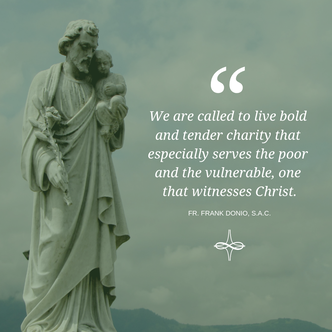 March 19th marks the Solemnity of St. Joseph, Spouse of the Blessed Virgin Mary and Patron of the Universal Church. These are rather lofty titles. He has many others. I first came to know St. Joseph, not only through the Nativity story, but because he was the patron of my parish church in Hammonton, New Jersey. As a child, I would look at the statue of St. Joseph to the right of the main altar and saw a wise looking, older person holding the child Jesus. His face was kind and tender, yet strong. Only later did I admire the work of the artist who was able to capture the essence of St. Joseph. Pope Francis, whose sixth anniversary of the inauguration of his ministry as pope is also on March 19th, reflected on these and other aspects of St. Joseph and what they mean for us: “In the Gospels, Saint Joseph appears as a strong and courageous man, a working man, yet in his heart we see great tenderness, which is not the virtue of the weak but rather a sign of strength of spirit and a capacity for concern, for compassion, for genuine openness to others, for love. We must not be afraid of goodness, of tenderness!” (Pope Francis, Homily, March 19, 2013) Charity or love, St. Thomas Aquinas tells us is “to will the good of the other.” (CCC, 1766). Goodness is not simply about being polite. It is much more than that. It is an opportunity to live love of neighbor in a way that is strong and bold at times. It is a way of showing love of God. Consider what St. Joseph did for Mary in taking her into his home (Mt. 1:24) or in moving the family to Egypt at a moment’s notice (Mt. 2:14). These were in response to God’s invitation to do so – an invitation that came in dreams. We are called to live bold and tender charity that especially serves the poor and the vulnerable, one that witnesses Christ. This is at the heart of the Lenten practice of almsgiving. It is this type of charity that “urges us on” as St. Paul tell us (2 Cor. 5:14). Pope Francis witnesses it, St. Vincent Pallotti lived it, and we are all called to do the same. May the Charity of Christ urge us on! Advent often feels too short to me. Maybe it’s the fact that the fourth week usually isn’t a full seven days because of which day Christmas lands on that year. Maybe it’s the hustle and bustle of trying to get ready for Christmas and checking everything off our Christmas to-do lists that overwhelms the quiet and hopeful period that Advent is meant to be. The secular culture we live in insists that it’s “Christmastime” as soon as the Thanksgiving turkey is eaten, that the Twelve Days of Christmas happen whenever in December people feel like doing them, that the Christmas festivities end with Christmas, and that Christmas Day is a finish line toward which we should all be sprinting with credit cards in hand.
In our home, my husband and I have made a conscious choice to incorporate more of the liturgical calendar into our daily family life. For us, this means striving to separate Christmas from Advent: Our house during Advent is sparsely decorated until Christmas Eve, and we try to focus on Advent hymns like “O Come, O Come Emmanuel” instead of Christmas carols. And while at first it may seem like we are being Scrooges or intentionally avoiding Christmas cheer, maintaining Advent as a time of preparation helps us keep the liturgical Christmastide as a true season of celebration. It’s harder to maintain a sense of joy and wonder on Christmas Day when the festivities have already been going on for almost a month. The more difficult thing for us, however, is not figuring out how to avoid celebrating Christmas in Advent, but how to maintain the spirit of Christmastide in a culture that throws out its trees and its traditions on the morning of December 26. It’s been difficult for us to keep the party going, so to speak, when everyone else is drafting New Year’s resolutions and bemoaning all the cookies they ate. The liturgical Christmas season deserves more attention in our homes. The span of days from Christmas Day to the Baptism of the Lord is a string of feast days and holy days—including St. Stephen (December 26), the Holy Innocents (December 28), the Holy Family (Sunday after Christmas), the Solemnity of Mary Mother of God (January 1), and the feast of the Epiphany (traditionally January 6). Christmastide is built for celebration! Every year, as we approach the end of Advent, my husband and I ask ourselves: How can we embrace the celebratory season of Christmastide? Here are some of our ideas.
Question for Reflection: How are the Advent and Christmas seasons different for you? How do you celebrate Christmastide? November 9th is a worldwide feast day celebrating the Dedication of the Lateran Basilica. It may seem silly to have a feast day devoted to a church; after all, we are used to commemorating great saints, like Cecilia (November 22nd) or Andrew the Apostle (November 30th), or an aspect of Christ’s life, like the Solemnity of Christ the King (this year, November 25th). So why celebrate a building? Sure, it is a church, Mass is held there, the Eucharist is housed there – but that can be said of any other Catholic church. What makes the Lateran Basilica so special?
The full name of this particular church is the Archbasilica of the Most Holy Savior and Saints John the Baptist and John the Evangelist at the Lateran. What a mouthful! The Lateran Basilica is one of the “major or papal basilicas,” the four highest-ranking churches in Roman Catholicism, due to their historical significance. The other three are St. Peter’s in the Vatican, St. Paul Outside the Walls, and St. Mary Major. St. John Lateran (as it is commonly known) is the oldest of the four, the oldest public church in Rome, and houses the cathedra (seat) of the pope in his capacity as the Bishop of Rome. Because it houses the cathedra, the basilica is the cathedral of the Diocese of Rome. It is also the sole holder of the title “archbasilica,” demonstrating its ranking above every other church in the world. An inscription on the façade of the building says, “Sacrosancta Lateranensis ecclesia omnium urbis et orbis ecclesiarum mater et caput.” Translated, it means, “The Most Holy Lateran Church, mother and head of all the churches in the city and the world.” Today’s feast day celebrates not only the physical structure itself, but also what it symbolizes. As the seat of the Holy Father, it reminds our hearts and minds of the fidelity we show to the successor of St. Peter, an expression of unity that binds together all the faithful. Moreover, the physical edifice of the church calls to mind what the Catechism states, “The Church is the Body of Christ” (CCC 805). While the Lateran Basilica itself is a magnificent building, housing priceless works of art, in the end it is just a hollow shell. The faithful who enter it, pray in it, and celebrate the Eucharist inside it are what truly bring it to life and bring its purpose to fulfillment. On this feast day, let us pray. Let us pray for the Holy Father, that he may continue to lead the faithful entrusted to his care. And let us pray for the Church, that her members may always work in unity to bring about Christ’s kingdom on earth. Victor David is a collaborator with the Catholic Apostolate Center and a staff member at The Catholic University of America in Washington, DC. Editor's note: In honor of the Solemnity of Saints Peter and Paul, a new blogger for the Catholic Apostolate Center writes about the nature of Christian brotherhood and friendship. Check out our post from last year on Peter and Paul for a little background on these great friends and evangelists.
To my fellow Christian brothers, Nothing worth doing in life is easy, and the Christian ideal is certainly no exception. As the profound early 20th century apologist G.K. Chesterton said in his book What’s Wrong with the World, “The Christian ideal has not been tried and found wanting. It has been found difficult; and left untried.” Those who recognize the Cross are called, now more than ever, to take it up. But do not try to bear the Cross alone: find other men who have accepted the weight of the Cross and have allowed God to write it on their hearts. Bear your burdens together. When you bear the Cross with your brother, you begin to form a real friendship with him – one based in vulnerability. We don’t often bring up vulnerability when talking about manliness, but it is one of the most vital qualities to have in the effort towards holiness. When Christ became man, this was the ultimate act of vulnerability. It did not stop there, though. Christ exemplified perfect holiness through His ultimate sacrifice on the Cross. By getting to know the true nature of your brother, you enter into a state of vulnerability with him where you can then challenge him to make strides towards holiness. When I asked Brother Barnabas, a Benedictine monk at Saint Vincent College, to weigh in on the topic of manliness and male Christian friendship, he recalled a time when he lived in a house with some close friends. “There certainly was a time for fellowship, especially when we had visitors,” said Brother Barnabas, “but when it was just us men around the table, we used to say, ‘alright guys, armor off.’ That’s when we would truly expose our hearts to each other and allow the Holy Spirit to strengthen us.” The relationship Barnabas talks about is the sort of relationship that binds men together and transcends spending time with your “bros.” It’s the type of relationship that doesn’t necessarily seem intuitive for men. Our culture usually portrays women as the ones who are willing to be honest and open with one another. Men are supposed to be stoic and reserved – they’re supposed to bear their sufferings quietly. Yet, we need to have the courage to reveal our true selves with absolute honesty to other men. When needed, we must have the courage to make sacrifices for our brothers and allow them to make sacrifices for us too. The burden of the Cross becomes lighter when you have a brother bearing it beside you. In the daily effort of conversion to the will of God, having a true friend can sometimes make all the difference. The Christian ideal is not easy to follow. We as men must come together, leave the armor at the door, and allow the Lord to work through our cooperation in becoming holy together. As the Lord leads us to holiness, let us ask him in the name of the Father, and of the Son, and of the Holy Spirit to give us brothers for the journey. Amen. Question for Reflection: Do you have friends with whom you can be vulnerable? In what ways can you help your friends bear their crosses? 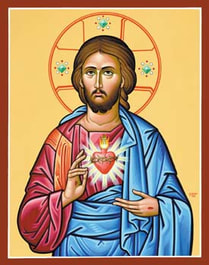 Whenever you think of Christianity, it is next to impossible to overlook the role and importance of love in the story of salvation. God’s love for us is one that is infinitely more enduring than any infatuation or passing attraction. It is one that gives and purifies, sacrifices and yields for the good of another -- again and again and again. God’s love is one that extends through, before, and beyond eternity and is ultimately expressed from Calvary to each and every person, fully, freely, and forever. The Church has dedicated the month of June to a reminder of the depth of God’s love: the devotion to the Sacred Heart of Jesus. In His Most Sacred Heart, we see how absolutely consumed with love God is for us — so much so that He was willing to bear those heinous wounds, false accusations and derisions, and even His death in order to grant salvation for all. Artistic depictions of the Sacred Heart remind us of the torment Christ endured on our behalf: the heart is wrapped in a crown of thorns, pierced, bleeding, and aflame with a cross rising from the tongues of fire. The visible wounds of Christ’s heart reveal His invisible love. Thus, devotion to the Sacred Heart is described as “devotion to the love of Jesus Christ in so far as this love is recalled and symbolically represented to us by His Heart of Flesh.” As creatures that have both soul and body, bodily representations of Christ’s love sometimes touch us in ways that words do not. The Sacred Heart teaches us that authentic love incurs great costs, but it also always gives life. Historically, devotion to the Sacred Heart is believed to have grown from another devotion to Jesus’ body: the Sacred Wounds of Christ from His Passion. Saint Bernard of Clairvaux said that the piercing of Christ’s side revealed His goodness and the charity of His heart for us: “How good and pleasant it is to dwell in the Heart of Jesus! Who is there who does not love a Heart so wounded? Who can refuse a return of love to a Heart so loving?” Other religious and saints, such as Francis of Assisi, have themselves exemplified closeness to the love poured out by Christ’s Five Wounds and Sacred Heart. The devotion as it is most commonly known today is said to have begun with the 1673 appearance of our Lord to St. Margaret Mary Alacoque, a French nun of the Order of the Visitation of Holy Mary. Over a series of visits, Our Lord revealed to St. Margaret Mary the importance of devotion to His Sacred Heart: "Behold the Heart which has so loved men that it has spared nothing, even to exhausting and consuming Itself, in order to testify Its love … But what I feel most keenly is that it is hearts which are consecrated to Me, that treat Me thus. Therefore, I ask of you that the Friday after the Octave of Corpus Christi be set apart for a special Feast to honor My Heart, by communicating on that day, and making reparation to It by a solemn act, in order to make amends for the indignities which It has received during the time It has been exposed on the altars. I promise you that My Heart shall expand Itself to shed in abundance the influence of Its Divine Love upon those who shall thus honor It, and cause It to be honored." In 1856, the Solemnity of the Sacred Heart was officially added to the liturgical calendar — the day before the Memorial of the Immaculate Heart of the Blessed Virgin Mary. The faithful have several options for honoring the Sacred Heart as requested by our Lord:
The Love that Christ continually showers on us should totally consume us. Christ’s death is an infinitely huge debt that we can never repay—but in His infinitely huge capacity to love and be merciful, all our Lord asks in return is our love. As we are invited to share in His Divine Love, we are called to let that love change us to become better disciples and better witnesses. Most of all, let us strive to become authors of great love stories, never ceasing to wonder at the incredible truth that the God of the Universe loves us! The Solemnity of the Most Sacred Heart is also the World Day of Prayer for the Sanctification of Priests. Please pray for the priests in your parish and any other priests who have touched your life! 5/9/2018 Everyday Holiness (Part 2): 10 Quotes from Pope Francis' Apostolic Exhortation to Help You Be Holy in Today's WorldRead NowOn April 9, the Solemnity of the Annunciation of the Lord, Pope Francis released his latest Apostolic Exhortation: Gaudete et Exsultate (Rejoice and Be Glad): On the Call to Holiness in Today’s World. This is the third Apostolic Exhortation of his papacy, following Evangelii Gaudium, the Apostolic Exhortation on the Proclamation of the Gospel in Today’s World and Amoris Laetitia, a post-synodal Apostolic Exhortation on Love in the Family. What was his goal? “To re-propose the call to holiness in a practical way for our own time, with all its risks, challenges and opportunities" (GE 2). Without delving too much into a theological or heady definition of holiness, Pope Francis invites us simply and straightforwardly to open ourselves to the specific and unique mission God has created us for. In this, he says, lies true joy and freedom. Our Holy Father takes us back to the Source of Holiness, Jesus Christ, and encourages us to look to the Beatitudes as guides for holiness. Below, I’ve compiled some of my favorite quotes and key take-aways from this approachable, yet profound, exhortation. 1.“A person’s perfection is measured not by the information or knowledge they possess, but by the depth of their charity.”-GE 37 It is tempting to leave the task of holiness to theologians, the clergy, or those who work for the institutional Church. Here, Pope Francis reminds us that holiness is not all about intellectual knowledge, our ability to quote the latest Church document, or the Catechism. While knowledge of the Faith certainly is important, our holiness is measured by the amount of love with which we infuse all of our actions. I can’t help but think of St. John of the Cross’s quote: “In the twilight of life, God will not judge us on our earthly possessions and human successes, but on how well we have loved. 2. “Jesus explained with great simplicity what it means to be holy when he gave us the Beatitudes (cf. Mt 5:3-12; Lk 6:20-23). The Beatitudes are like a Christian’s identity card…In the Beatitudes, we find a portrait of the Master, which we are called to reflect in our daily lives.” -GE 63 I love that Pope Francis ultimately leads us to Scripture and to Jesus Christ Himself as the model and teacher of holiness. It can get overwhelming trying to be holy and define holiness in our modern world. The Beatitudes, Pope Francis says, are like a “Christian’s identity card.” They point us directly to holiness and guide us along the way. Spending time reflecting on each of the Beatitudes will help us to better understand what it means and looks like to be holy. 3. “It is true that the primacy belongs to our relationship with God, but we cannot forget that the ultimate criterion on which our lives will be judged is what we have done for others. Prayer is most precious, for it nourishes a daily commitment to love. Our worship becomes pleasing to God when we devote ourselves to living generously, and allow God’s gift, granted in prayer, to be shown in our concern for our brothers and sisters.” –GE 104 Here, Pope Francis is reminding us that our prayer must lead to action. We cannot be holy in a vacuum, but are called to live out holiness amidst our brothers and sisters. Service to the world, as promoted by Catholic Social Teaching, is crucial if we are to be true followers of Christ. While our relationship with God always comes first, this relationship turns our gaze outward in order to foster and build relationships of love, service, and communion with our brothers and sisters. 4.“Far from being timid, morose, acerbic or melancholy, or putting on a dreary face, the saints are joyful and full of good humour. Though completely realistic, they radiate a positive and hopeful spirit.” -GE 122 Holiness leads to joy – this is the true fruit of our living a holy life. As Christians, we are called to exude the joy of the Resurrection and of the Gospel in the midst of a world plagued by sin, brokenness, and suffering. While holiness is joyful, is does not exist in an alternate reality, but embraces the truth of the world in which we live. Pope Francis says that this holiness is “realistic” and allows us to engage the world while still looking beyond it to the glory of eternal life. 5. “God is eternal newness. He impels us constantly to set out anew, to pass beyond what is familiar, to the fringes and beyond. He takes us to where humanity is most wounded... God is not afraid! He is fearless! He is always greater than our plans and schemes. Unafraid of the fringes, he himself became a fringe (cf. Phil 2:6-8; Jn 1:14). So if we dare to go to the fringes, we will find him there; indeed, he is already there.” –GE 135 The theme of going outside our comfort zone has been one Pope Francis has promoted since the beginning of his papacy. He calls us as Christians and as the Church to wake up, open our doors, and shake the dust off ourselves by imitating God who is “eternal newness.” Holiness, therefore, means being active, bold, and unafraid. It means meeting Christ in the fringes of society and finding him outside the confines of our Church walls. 6.“Let us allow the Lord to rouse us from our torpor, to free us from our inertia. Let us rethink our usual way of doing things; let us open our eyes and ears, and above all our hearts, so as not to be complacent about things as they are, but unsettled by the living and effective word of the risen Lord.” –GE 137 Here, Pope Francis continues to invite the Church to an examination of conscience. Are we doing things out of habit, because we’ve always done something a certain way, or are we open to the promptings and workings of the Holy Spirit as we approach our task of holiness and evangelization? The example and word of Jesus Christ should always “unsettle” us to some degree. We do not achieve perfect holiness at some point in our life and then rest on our haunches! The journey lasts throughout our lifetime. 7.“Are there moments when you place yourself quietly in the Lord’s presence, when you calmly spend time with him, when you bask in his gaze? Do you let his fire inflame your heart? Unless you let him warm you more and more with his love and tenderness, you will not catch fire. How will you then be able to set the hearts of others on fire by your words and witness? If, gazing on the face of Christ, you feel unable to let yourself be healed and transformed, then enter into the Lord’s heart, into his wounds, for that is the abode of divine mercy.” -GE 151 I love this passage from Gaudete et Exsultate. Pope Francis takes on a more reflective tone here and invites us to be prayerful along our journey to holiness. He gets to the heart of holiness by asking us some profound but unavoidable questions. Essentially, he’s asking if we have truly encountered Jesus Christ and his infinite love. This is fundamental to holiness, for our encounter with Christ’s love is what will carry us forward on our journey and sustain us. Take some time to pray with these questions and ask the Lord for a deeper encounter with his love. 8.“For this spiritual combat, we can count on the powerful weapons that the Lord has given us: faith-filled prayer, meditation on the word of God, the celebration of Mass, Eucharistic adoration, sacramental Reconciliation, works of charity, community life, missionary outreach. If we become careless, the false promises of evil will easily seduce us.” –GE 162 As with any journey, we will encounter setbacks and temptations as we strive for holiness. Pope Francis devotes a section of his exhortation to the reality of evil and our need to acknowledge it. Pursuing holiness also means engaging in spiritual combat. We not only face our own weaknesses or the sins of others, we also face an actual opponent: the devil. Here, Pope Francis encourages us to count on “the powerful weapons that the Lord has given us.” We are not alone as we face evil, but find our strength in the Church, the sacraments, our brothers and sisters, etc. 9. "Discernment is necessary not only at extraordinary times, when we need to resolve grave problems and make crucial decisions. It is a means of spiritual combat for helping us to follow the Lord more faithfully. We need it at all times, to help us recognize God’s timetable, lest we fail to heed the promptings of his grace and disregard his invitation to grow." –GE 169 Discernment is a way of life. It means inviting the Lord into our actions and decisions and asking for his guidance as we go about our day. Pope Francis reminds us that discernment is not reserved only for major life decisions such as a move, our vocation, a job opportunity, etc. Discernment should be engrained into our spiritual life and helps to ensure that we are living our lives according to God’s plan rather than our own. 10.“Mary is the saint among the saints, blessed above all others. She teaches us the way of holiness and she walks ever at our side. She does not let us remain fallen and at times she takes us into her arms without judging us. Our converse with her consoles, frees and sanctifies us.” -GE 176 We cannot pursue holiness without looking to the perfect model of human holiness: the Blessed Virgin Mary. Pope Francis concludes his exhortation by inviting us not only to look to Mary, but to go to her and build a relationship with her. She always guides us closer to her Son. Mary is a gift to us given by Christ himself to journey alongside us on the path to heaven, don’t forget to use her as a resource! **This is part two of a two-part series of quotes from Pope Francis’ latest Apostolic Exhortation: Gaudete et Exsultate. For more information and resources on Gaudete et Exsultate, please click here. Questions for Reflection: How does Pope Francis challenge your idea of holiness? Do you agree with the Holy Father’s definition? Where do you see holiness being lived out today? 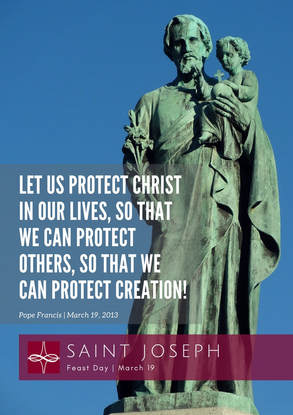 "In the Gospels, Saint Joseph appears as a strong and courageous man, a working man, yet in his heart we see great tenderness, which is not the virtue of the weak but rather a sign of strength of spirit and a capacity for concern, for compassion, for genuine openness to others, for love. We must not be afraid of goodness, of tenderness!" - Pope Francis (Homily for the Beginning of the Petrine Ministry of the Bishop of Rome, March 19, 2013) Blessings on this Solemnity of St. Joseph! As we celebrate this feast day of the Patron of the Universal Church, we also celebrate the fifth anniversary of the beginning of the Petrine ministry of Pope Francis. He chose this day particularly for this event and later inserted an invocation of St. Joseph into all the Eucharistic Prayers, not simply Eucharistic Prayer I (Roman Canon). Pope Francis not only invites us to see St. Joseph as protector of the Universal Church, but also calls us all to be protectors who live with tenderness that shows the love of Christ. What does it mean to be a "protector"? In the same homily quoted above, he offers us an answer, which he witnesses as pope. "In [St. Joseph], dear friends, we learn how to respond to God's call, readily and willingly, but we also see the core of the Christian vocation, which is Christ! Let us protect Christ in our lives, so that we can protect others, so that we can protect creation! The vocation of being a "protector", however, is not just something involving us Christians alone; it also has a prior dimension which is simply human, involving everyone. It means protecting all creation, the beauty of the created world, as the Book of Genesis tells us and as Saint Francis of Assisi showed us. It means respecting each of God's creatures and respecting the environment in which we live. It means protecting people, showing loving concern for each and every person, especially children, the elderly, those in need, who are often the last we think about. It means caring for one another in our families: husbands and wives first protect one another, and then, as parents, they care for their children, and children themselves, in time, protect their parents. It means building sincere friendships in which we protect one another in trust, respect, and goodness. In the end, everything has been entrusted to our protection, and all of us are responsible for it. Be protectors of God's gifts!" As one can see from the highlights above which link to an encyclical, two apostolic exhortations, and the bull of indiction of the Extraordinary Jubilee of Mercy, Pope Francis outlined in his inaugural homily some of the themes of the teaching of his pontificate. His actions toward those on the peripheries witness as well to how we can both protect and show tenderness, "responding to God's call" as St. Joseph did. For as he said also in his homily, "only those who serve with love are able to protect!" May the Charity of Christ urge us on! My son is just learning to walk. At 15 months, he’s starting to take his first, unsteady steps. He wobbles from chunky leg to chunky leg, looking back at us to make sure everything is alright, and plops on the floor after a few strides. He loves it when we cheer him on, and then he gets back up and begins again. We, too, are beginning again. We have walked into a new calendar year. This Monday, we will celebrate the end of the Christmas season on the Solemnity of the Baptism of Our Lord and enter into Ordinary Time. How are we walking into the new year? As a parent, I know my son is taking his first steps towards walking securely. Little does he know that these steps will prepare him to one day run. I know his trajectory, but the path for him is still unknown. Similarly, God knows our path. He knows what He created us to be and do, what our gifts and talents are. He made us to run, and yet He does not interfere with our free will. We, like my son, are often walking into an unknown future. We take step after step in faith with God walking alongside us. How do we make our journey? Are we stumbling or walking confidently in God’s grace? Do we look to Him when things seem unbalanced and reach for His hand? Even when things seem steady, do we turn back, like my son looks to his parents, and look for God and His reassuring presence? Do we ask God for His help and guidance? God walks with us throughout each chapter of our lives. His coming into the world in the Incarnation, which we celebrated at Christmas, is a beautiful and mysterious proof of the lengths God is willing to go to be with us. He wanted to be intimately involved in the human story—and so He became one of us. He interacted with mankind as a man Himself, ultimately taking on the weight of our sin and opening the doors to salvation. God intervened in a radical and beautiful way by physically walking alongside us in the person of Jesus Christ, and He continues to do so through His church, the sacraments, prayer, and our communities. As we end the celebration of Christmas and enter into the new year and Ordinary Time, I invite you to reflect on how you are walking into this season of life. We have spent the weeks of Advent preparing for and celebrating the coming of Jesus Christ into our midst. But have we left Him in the manger? Have we forgotten to bring the Christ child home with us or kept room for Him in the inn of our hearts? Let us allow God to be intimately a part of our lives throughout this upcoming year. May we walk with Him and towards Him each day, whether we are stumbling or walking confidently, so that we, like my son, may come one day to run. Question for Reflection: How can you walk more closely with God and toward Him this year? Besides receiving and visiting Our Lord in the Blessed Sacrament at Mass and Adoration, I find that the most nourishing aspect of my spiritual life is friendship with the saints. The Church holds celebrating the saints and asking for their intercession in high regard, as the Solemnity of All Saints, which falls on November 1st each year, is a holy day of obligation. The Vigil of All Saints, then, falls on October 31st each year. One goal of the Christian is to engage in prayer with God, and prayer, simply put, is conversing with God. Each day, we can offer our work to God and talk to Him frequently. This is not always easy, though, and I have found that friendship with the saints helps immensely. A friendship, which is the mutual willing of the good between people, is cultivated with communication and time spent together. Aristotle and Shakespeare, in their genius commentaries on friendship, always return to the simplicity of authentic friendship. Developing a friendship with the saints does not need to be overly-complex. It can also be founded upon communication and time spent together, ultimately bringing us closer to God and strengthening our communication with Him. Communicating daily with the saints further orients our minds to the supernatural, to the existence of the “things…invisible” that we recite in the Creed, and it also strengthens us in the fight for our souls. By communicating with the saints, we will become more like the saints, who in their devotion to Christ became like Christ. Thus, the saints will help us to become more Christ-like. The poet Gerard Manley Hopkins gets at this point in one of his poems: I say móre: the just man justices; Keeps grace: thát keeps all his goings graces; Acts in God's eye what in God's eye he is -- Chríst — for Christ plays in ten thousand places, Lovely in limbs, and lovely in eyes not his To the Father through the features of men's faces. The “just man” is the saint, and the saint’s Christ-like actions help him to become like Christ. As I mentioned in my last blog, stories of the saints are dramas of the highest caliber. Each saint had a unique personality and found their way to heaven in their own special, grace-filled way. There are so many saints that everyone can find someone they relate to or want to emulate. Below, I have listed just a few of my friends, and I pray that they will intercede for you! Sts. Peter and Paul, St. Edmund Campion, St. Ignatius, St. John the Beloved Disciple, St. Luke, St. Catherine of Sienna, St. John Paul II, Bl. Pier Giorgio Frassati, Bl. John Henry Newman, Sts. Thomas More and John Fisher, St. Robert Southwell, St. Henry Walpole, St. Aloysius Gonzaga, St. Robert Bellarmine, St. John Berchmans, St. Francis Xavier, St. Leo the Great, St. Augustine, St. Vincent Pallotti, St. Thomas Aquinas, St. Therese of Lisieux, St. Teresa of Avila, St. Josemaria Escriva, St. John Vianney, St. Joseph, Guardian Angels, Our Lady… Ora pro nobis! "I am the living bread that came down from heaven; whoever eats this bread will live forever; and the bread that I will give is my flesh for the life of the world."-John 6:51 This Sunday, the Church celebrates the Solemnity of Corpus Christi, the feast commemorating the institution of the Eucharist. In Sunday’s Gospel reading, Jesus says the words above after performing the miracle of the multiplication of the loaves and fish. When he states these words, Jesus has already been preaching and healing as part of his ministry for some time. He has performed many miracles and healed many people. He has taught in synagogues and given the Sermon on the Mount. He has accrued a steady following and fostered great interest throughout Judea and Galilee. Now, Jesus takes his teaching to the next level by beginning his discourse on his real presence in the Eucharist. In this discourse, Jesus says exactly what he means. He does not haphazardly preach or simply say what the people wish to hear. Jesus is not concerned about whether his teaching will offend others or be misinterpreted—so much so that he does not recant his words even after many of his followers decide to abandon him because of this teaching. When he is questioned about his words, rather than hastily coming up with an explanation or saying that he is only speaking figuratively, Jesus instead becomes even more precise in his language. In order to ensure that those around him fully understand the seemingly baffling words he has just stated, Jesus reiterates and continues more solemnly, "Amen, amen, I say to you, unless you eat the flesh of the Son of Man and drink his blood, you do not have life within you. Whoever eats my flesh and drinks my blood has eternal life, and I will raise him on the last day.” If those listening to him had any misconception or misunderstanding, Jesus makes his point abundantly clear. The same God who created the world through the Word now speaks words that will ultimately form a new creation: bread and wine transformed into his Body and Blood. As St. Ambrose asks, “Could not Christ's word, which can make from nothing what did not exist, change existing things into what they were not before?” (CCC 1375) Why did Jesus institute the Eucharist, which we celebrate today? The Catechism of the Catholic Church states that he did so “in order to perpetuate the sacrifice of the cross throughout the ages until he should come again, and so to entrust to his beloved Spouse, the Church, a memorial of his death and resurrection: a sacrament of love, a sign of unity, a bond of charity, a Paschal banquet 'in which Christ is consumed, the mind is filled with grace, and a pledge of future glory is given to us.'" Christ’s words come before the sacrifice on the Cross but are meant to instruct his followers regarding God’s promise of salvation. Just as Adam and Eve fell by the consumption of food, we are saved by the consumption of food—bread and wine transformed into the Body and Blood of Christ. It’s a beautiful similarity. Although his Passion completely took on the burden of sin and opened the doors of heaven back to mankind, Jesus loves humanity so much that he cannot bear to “leave us orphans” (cf John 14:18). As a result, he remains with us in the Eucharist, which renews his sacrifice on the Cross at every Mass and allows us to consume him. Christ knows that, “Besides physical hunger, man experiences another hunger, a hunger that cannot be satiated with ordinary food. It’s a hunger for life, a hunger for love, a hunger for eternity.” He appeases this hunger for life by giving us life itself, this hunger for love with love itself, this hunger for eternity with eternity itself. We need God himself in order to be satiated. Pope Francis said in his Corpus Christi homily in 2014 that, “The Eucharist communicates the Lord’s love for us: a love so great that it nourishes us with Himself; a freely given love, always available to every person who hungers and needs to regenerate his own strength.” This communication of love for us is abundant and humbling. Christ gives us himself every single time we attend Mass or visit the Blessed Sacrament in order to regenerate our strength on the journey towards heaven. Having taken “the form of a slave, coming in human likeness; and found human in appearance,” Jesus knows the struggles and hardships of mankind. Jesus knows our hunger (cf Phil 2:7). And so he feeds us, sustains us, and nourishes us with himself. “The Church and the world have a great need for Eucharistic worship. Jesus awaits us in this sacrament of love,” John Paul II wrote in Dominicae cenae. Will you meet him there? Will you allow him to satiate your hunger? Let us close with this prayer from Pope Francis: Jesus, defend us from the temptation of worldly food which enslaves us, tainted food; purify our memory, so it isn’t imprisoned in selfish and worldly selectivity, but that it may be a living memory of your presence throughout the history of your people, a memory that makes a “monument” of your gesture of redeeming love. Amen. Question for Reflection: What are some worldly foods that may be preventing you from more fully receiving Jesus in the Eucharist? Each year on the first Sunday after Pentecost we celebrate the Solemnity of the Most Holy Trinity, also known as Trinity Sunday. Although it wasn’t until 1334 that Pope John XXII officially established the feast for universal observance in the Western Church, the mystery of the Holy Trinity has been the pulse of the Church’s life since the very beginning. The Trinity is “the central mystery of Christian faith and life…[and is] the source of all the other mysteries of faith” (CCC 234). The whole of the Church’s life flows from the central belief that the one true God exists as three divine Persons—Father, Son, and Holy Spirit. Since the very beginning of time, God has gradually revealed and communicated the truth of who he is as Trinitarian through what he has done in salvation history (see CCC 53-67). Although God gradually revealed himself throughout different stages of the Old Testament period of salvation history, mankind had no way of knowing the full truth of God’s inner life of the Trinity before the time of Christ, since this mystery of our faith is “inaccessible to human reason alone…before the Incarnation of God’s Son and the sending of the Holy Spirit” (CCC 237). In his encyclical Spe Salvi, Pope Benedict XVI poses a challenging question: “So now we must ask explicitly: is the Christian faith also for us today a life-changing and life-sustaining hope…which shapes our life in a new way, or is it just ‘information’” (Spe Salvi 10) that doesn’t change us? Furthermore, what difference does this central mystery of our faith make in our daily lives? Trinity Sunday is an invitation to remember that “[being] Christian is not the result of an ethical choice or a lofty idea, but the encounter with an event, a person, which gives life a new horizon and a decisive direction” (Deus Caritas Est 1). In revealing himself as Trinitarian, God hasn’t merely shared impersonal facts about himself; rather, God has shared himself with us, and has invited us into his own inner life and communion of love, which alone is the origin, goal, and meaning of our life. As we read in the Catechism, “By sending his only Son and the Spirit of Love in the fullness of time, God has revealed his innermost secret: God himself is an eternal exchange of love, Father, Son and Holy Spirit, and he has destined us to share in that exchange” (CCC 221). On Trinity Sunday, the Church proclaims the truth about God—that God is love (1 John 4:8)—and the truth about us: we are made for this love. We eternally belong to God—we have an eternal home! St. Elizabeth of the Trinity leads us more deeply into this reality by saying that “The Trinity—this is our dwelling, our ‘home,’ the Father’s house that we must never leave.” When speaking with his disciples before his Passion, Jesus directed the gaze of their hearts towards this truth: “In my Father’s house there are many rooms…and when I go and prepare a place for you, I will come again and will take you to myself, that where I am you may be also” (John 14:2-3). Jesus continued to reveal more of the Father’s loving plan: “I will not leave you orphans; I will come to you…If a man loves me, he will keep my word, and my Father will love him, and we will come to him and make our home with him” (John 14:18, 23). Jesus reveals to his disciples the Father’s breathtaking desire. He desires not only that we be at home in him when we get to heaven in the future, but he desires us to be at home in him now—and so, he comes to us, he makes his home among us (c.f., John 1:14) in order to make his home in us. Thus, with the Feast of Pentecost and the sending of the Holy Spirit, God fulfills his promise to never leave us orphans. This is why the Church celebrates Trinity Sunday the week after Pentecost: On Pentecost, “the Holy Trinity is fully revealed” (CCC 732). “I will not leave you orphans!” If Jesus has promised to never leave us orphans, then that means we have a permanent home—we eternally belong to the Father as children of his heavenly household! This is the mystery into which the Church invites us more deeply on the Solemnity of the Most Holy Trinity. Yet this truth is also the very gift that that we are invited to share with all whom God entrusts to us in our daily lives: “Love one another as I have loved you” (John 15:12). Every human heart longs for its eternal home. Today, we invite the Trinity to be more at home in our hearts in order to make them a more welcoming home for others—that through our smile, our gentleness, our availability of heart, everyone whom the Father entrusts to us may experience the Love that is their eternal home. Question for Reflection: Today, will we allow our hearts to be touched and changed by the reality into which Trinity Sunday invites us more deeply? |
Details
Archives
July 2024
Categories
All
|
About |
Media |
© COPYRIGHT 2024 | ALL RIGHTS RESERVED

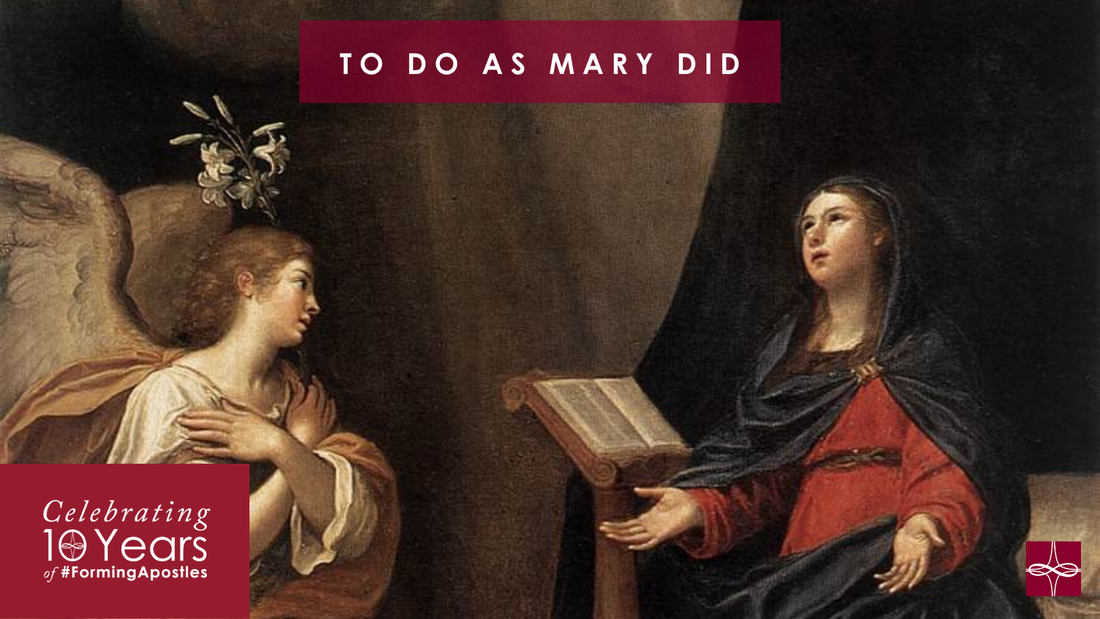

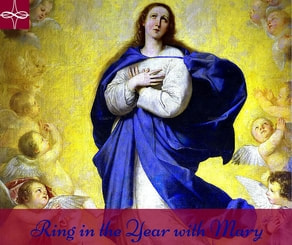

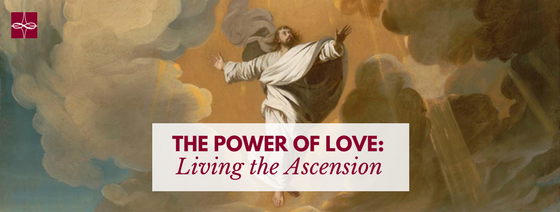

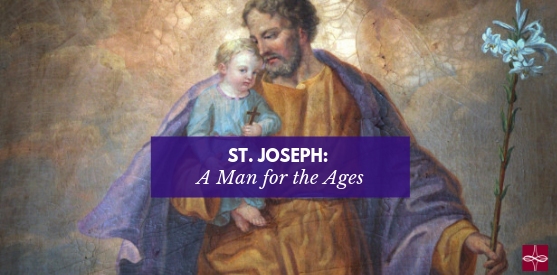

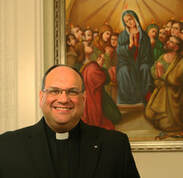
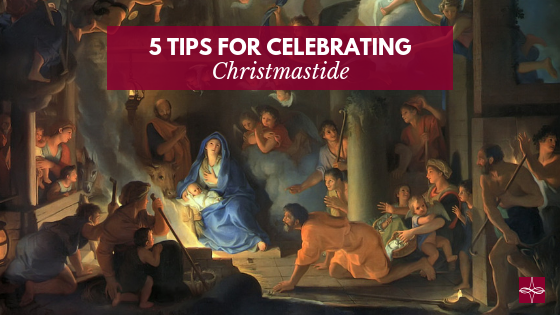

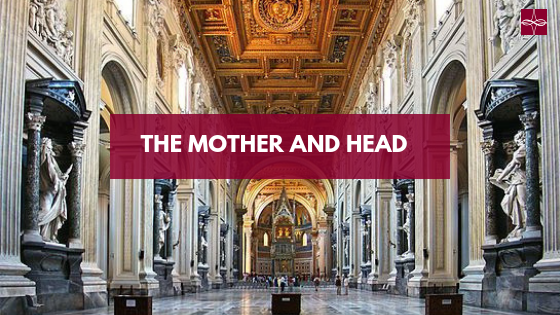
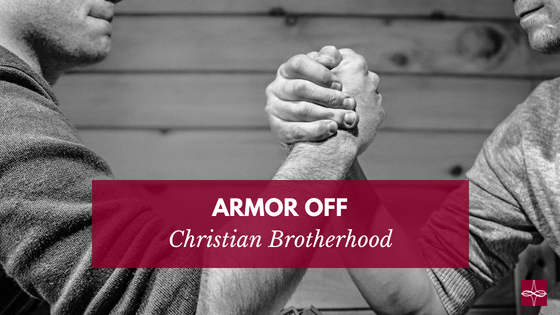

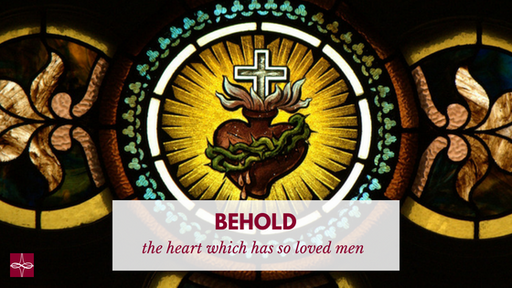

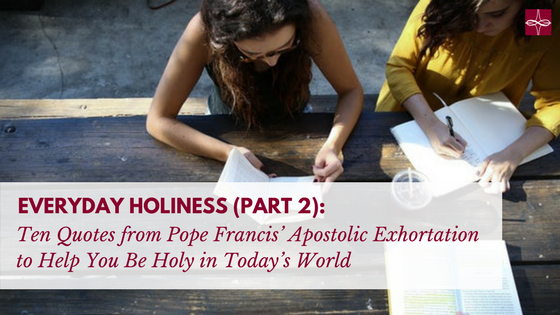

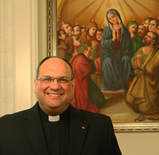


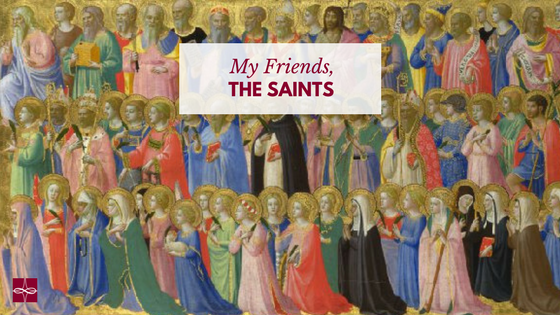

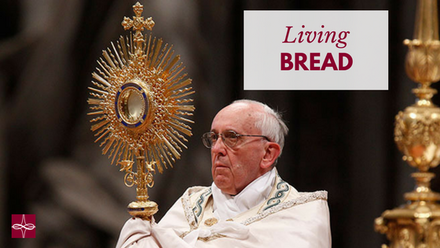

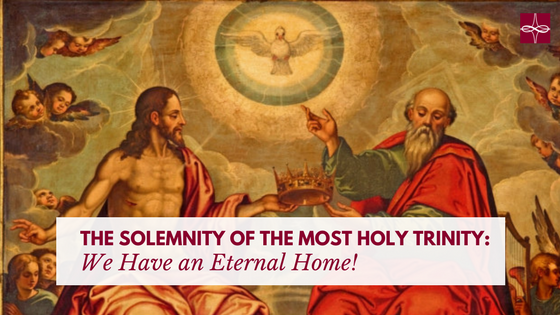

 RSS Feed
RSS Feed